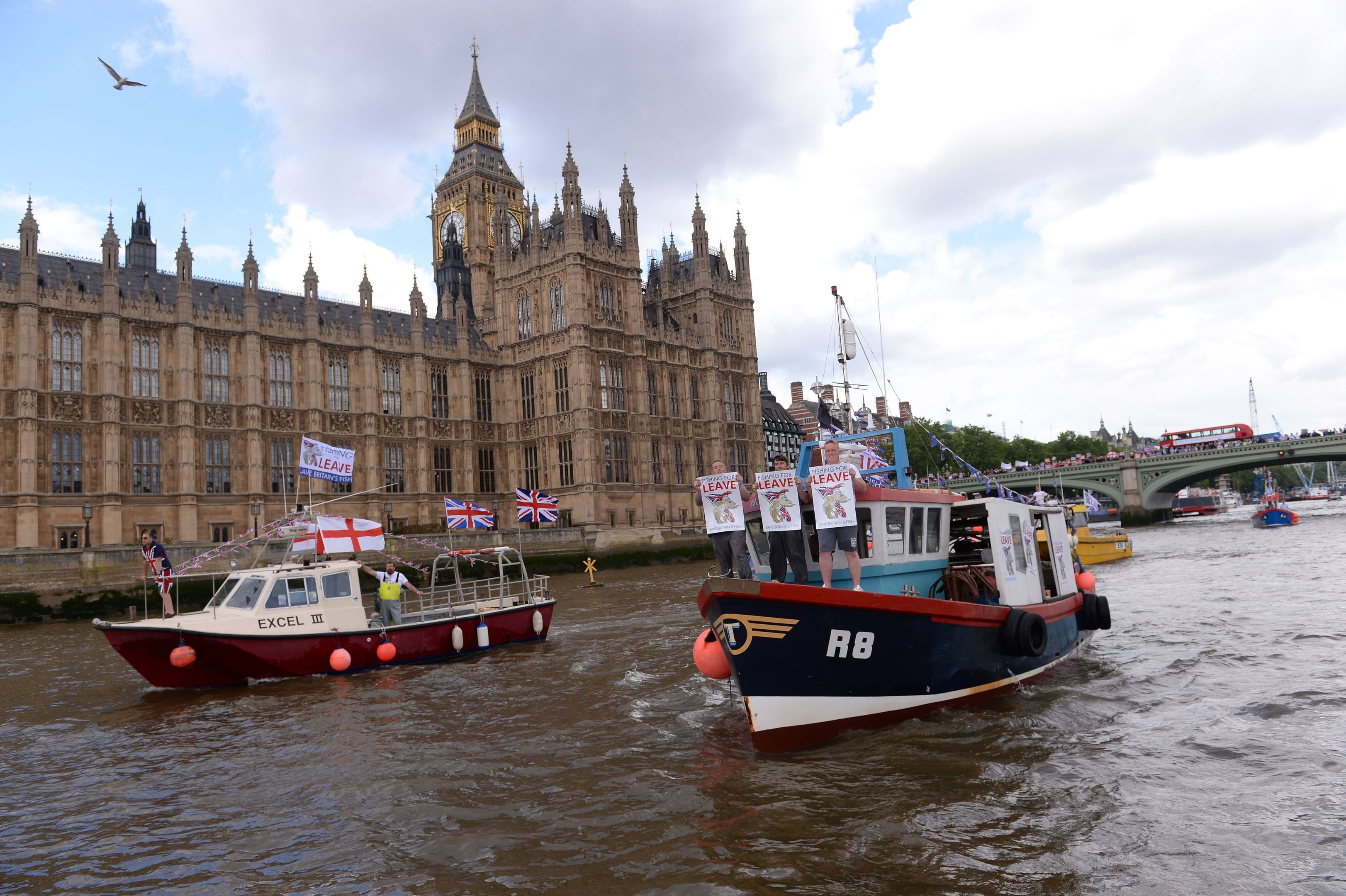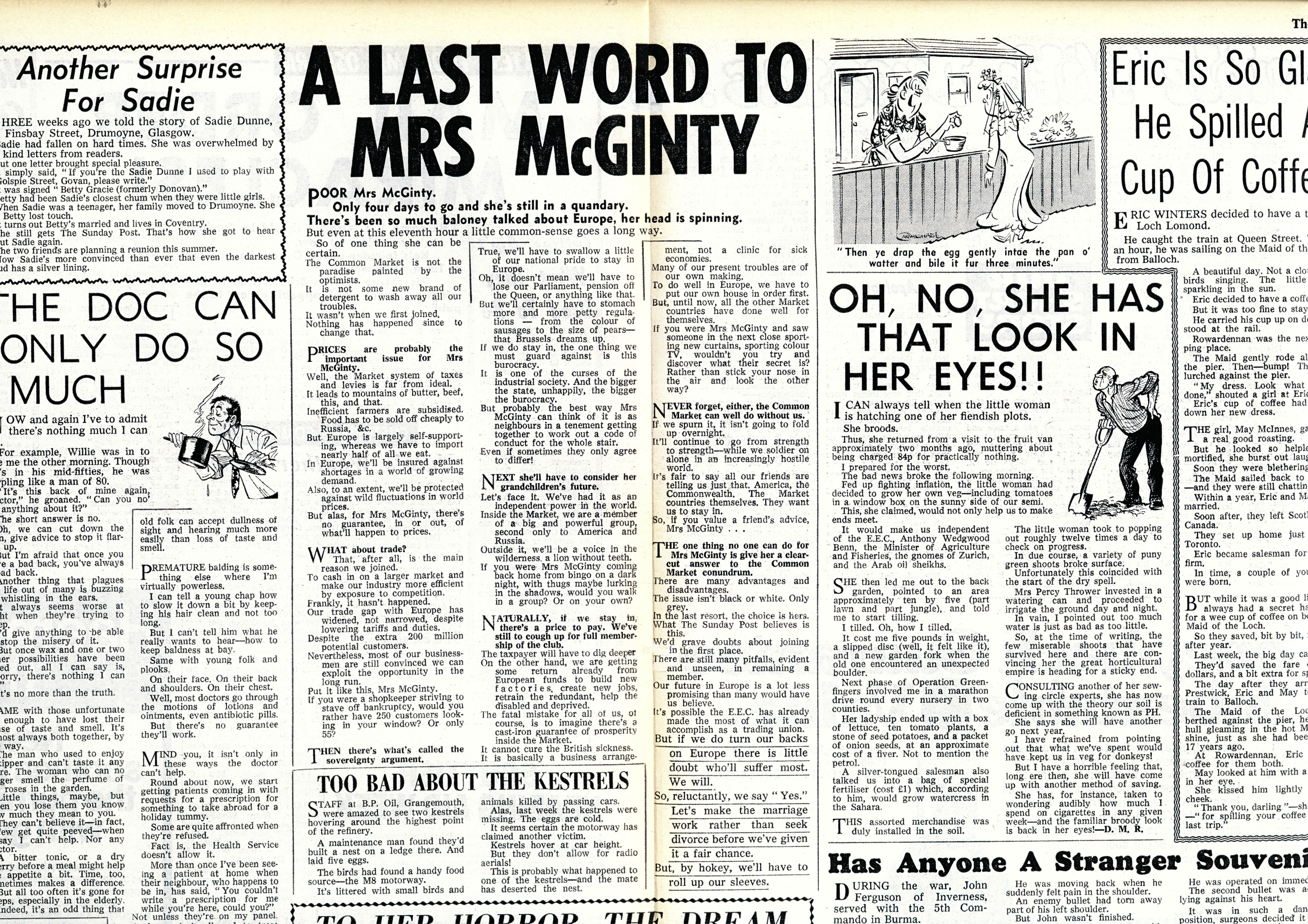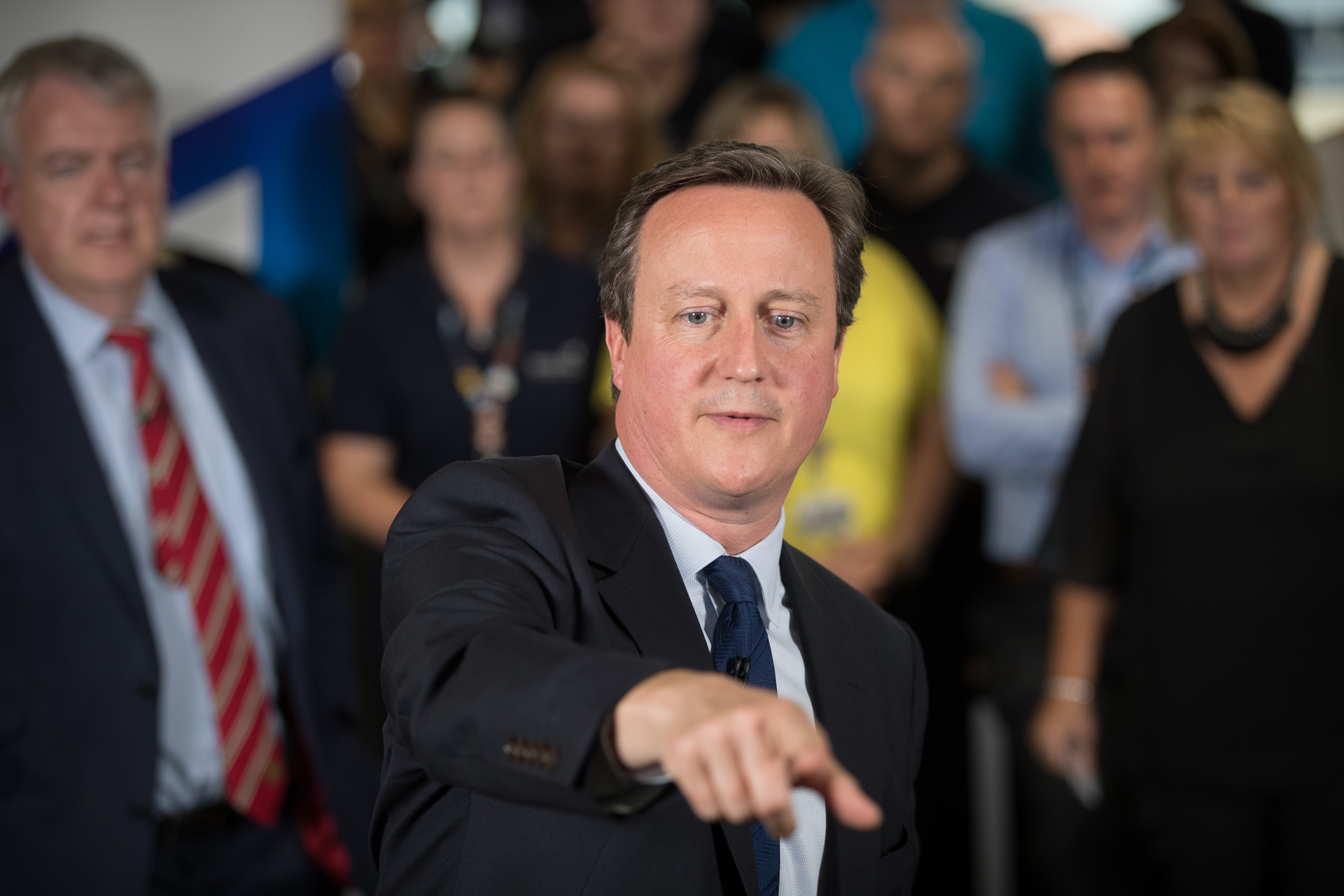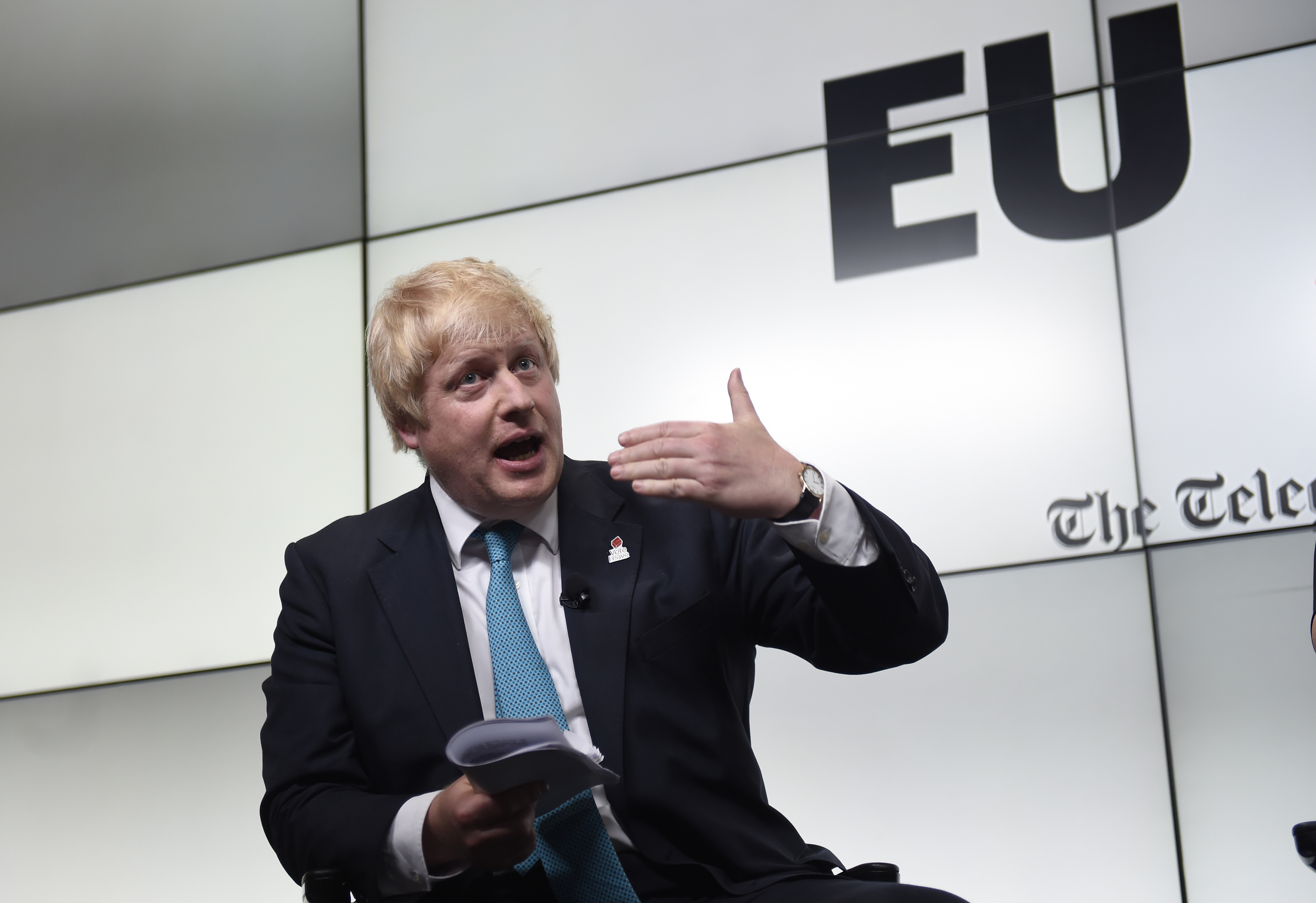
THE issues being played out ahead of this week’s EU referendum will be familiar to those who remember 1975, when voters backed the UK’s continued membership of the EEC.
The campaign then was dominated by the economy and on the eve of the vote, we laid out what was at stake with an editorial to Mrs McGinty – a favourite shorthand that the then editor, Bill Anderson, used to refer to the man or woman in the street.
We are today re-publishing the Mrs McGinty article in full but also giving readers a run-through of the issues which dominate this campaign, given that the modern EU is a much bigger and more complicated beast than it was back in 1975.

Immigration
REMAIN
An estimated £20 billion was contributed to the British economy in the last decade by EU migrants. Taking back control of our borders is the big sell for Brexit campaigners but some countries, Norway and Switzerland for example, found that in order to trade with the EU, they still had to strike a deal on the freedom of movement.
LEAVE
Stopping the number of people from overseas settling into the UK would reduce the pressure being heaped on public services, such as the NHS, by migrants. Leaving the UK means the UK no longer has to accept the free movement of people, in short it can let as few or as many people over its borders as it likes. This would reduce the pool of competition for UK jobs.
THE REALITY
For Mrs McGinty immigration wasn’t a big issue but fast forward four decades and it’s been one of the defining issues of the campaign. The cold reality is the UK needs people from the EU to do the jobs which people here are either not able – or more likely, not willing – to do. But equally, the free movement of people in the EU can make finding work more difficult for Brits. There’s no easy answer to this but overall EU immigration helps to oil the wheels of our economy.
Pensions
REMAIN
The UK Government has said the move could see £32,000 wiped off the average pensioner’s wealth if the stock market falls and the returns made by the big pension funds shrink. A weakening of the pound could also spark a hike in inflation which would impact pension incomes.
LEAVE
There’s few Brexiteers who don’t accept, at least privately, there would not be at the very least a shock to the economy and stock markets if there is a Leave vote. This directly impacts the amount of money pension funds can make. But, taking the long view, this could easily level out, and the amount paid out in state pensions would still be decided and protected by the UK Government.
THE REALITY
Any jolt to the UK’s financial services market world will have an impact on the money made by pension funds. The growth of private pensions since 1975 makes this a big deal. Of more concern to many is what happens with the state pension. It represents a huge chunk of public spending and if Treasury spending is squeezed, it will be under pressure. But that would be a political decision, rather than one dictated by the markets.
The Law
REMAIN
Despite the hyperbole which has surrounded this issue in the campaign, only about 15% of our laws come from Brussels and they mainly cover non-contentious areas such as consumer rights. We have a cherished opt out of big EU projects such as the Euro.
LEAVE
EU law is supreme over British law, meaning the British public cannot vote out those who make our laws. Where leave campaigners have made most gains on the legal arguments is where the European Courts limit the UK legal system’s ability to deport violent criminals.
THE REALITY
The majority of EU laws which impact the UK are positive, forcing car manufacturers to make less polluting cars or giving workers better protection from their employers. It is not beyond the wit of the UK parliaments to come up with similar laws but enforcement works much better on a pan-European level. However, the EU’s “mission creep” since the days of Mrs McGinty now sees it regularly challenge the tenets of our criminal justice system. This is a constant source of frustration.
The Economy
REMAIN
The remain camp estimates the benefit to the UK of being a part of the EU is £91 billion, with around three million jobs linked to EU trade. The Bank of England has warned leaving the EU could tip the UK’s brittle economy into recession, with 950,000 jobs lost.
LEAVE
Despite the tales of doom, the UK could negotiate new trade agreements once it was out of the EU, and arguably get a good deal. Leave campaigners argue the EU is an over-centralised “jobs destroying machine” that prevents us from setting VAT rates and managing our economy to our advantage.
THE REALITY
The UK is a big trading partner for all of Europe – much bigger than in Mrs McGinty’s day – and this isn’t going to change overnight if we’re out of the EU. New trade deals would be struck, the crucial question is how long that will that take and will they leave our businesses better or worse off. That is an unknown and such uncertainty doesn’t breed confidence. An immediate post-Brexit vote slump is inventible given the markets and business groups are so pro EU, it is what follows which is crucial. Any prolonged slump would easily slide the delicate UK economy back into recession.
Travel
REMAIN
It is estimated the average family saves around £350 a year through cheaper goods and consumer rights as a result of laws passed by the EU. Brits are also covered by a health insurance scheme which means you don’t pay for treatment overseas.
LEAVE
Upon Brexit, travellers would benefit from duty free goods when moving between the UK and the EU. Leave campaigners argue there would be little scope for the cost of holidays or roaming charges to go up again. In addition, non-EU states have deals which means they can access the health insurance scheme.
THE REALITY
Glasgow Airport was not even a decade old when Mrs Mcginty was weighing up which way to vote in 1975. The airport now boasts dozens of flights to Europe. Much of the ease of this has been made possible by EU laws, from free health insurance to cheaper calls abroad. Now the UK outside of the EU could, like Iceland or Switzerland, negotiate a deal to stay in the European Health Insurance Card for example, but at what price?
Workers’ Rights
REMAIN
Workers, particularly those at the lower paid end, have done well out of the EU, with initiatives such as the 48-hour working time directive and laws to ensure part-time workers can get pensions. The right to maternity leave and paid holidays are also protected under EU law.
LEAVE
Many of the workers’ rights enshrined in EU law are already protected by UK law and some instances, such as maternity leave actually go further. A strong Leave argument is that much of EU-generated red tape, estimated to cost British business £33 billion a year, could be cut with Brexit, allowing firms to hire more staff.
THE REALITY
The chances of any future Government rowing back on workers’ rights are small but any future advances coming from the EU might be easily skipped. Dropping out of the working time directive means employers can demand staff work longer hours, while the things which cost the state money – such as statutory maternity leave – could be under threat if the economy does go into meltdown post-Brexit and the UK Government is having to make huge cuts across the board.
Your Views:
BACK in 1975, we asked 200 young people on Glasgow’s Sauchiehall Street how they would be voting in the crunch referendum.
Fast-forward 41 years and we’ve conducted the same poll to see what people make of the current EU debate. Last time around, there were a total of 62% people in favour of remaining in the EU, 23% wanted out while 15% were not sure. Last week, we found that views of young Scots have not shifted much in four decades. Our poll revealed that 62% back Remain, 28% back Leave and the rest are undecided.
Below is a selection of the views of the people in 1975 and from last week.
Community worker Ann Cowieson, 21, Glasgow: “I think it’s common sense to share resources and responsibilities like defence. Our days as a great nation are over. Now it’s time to look to the future as part of the EEC.”
Student Alasdair Williamson, 20, Bishopbriggs: “I don’t see any benefits for Scotland in the Market. Our oil boom’s on the way. We’re soon going to be in a very healthy position.”
Student John Thompson, 21, Glasgow: “It would be a terrible decision to sacrifice the right to govern ourselves. In Europe, we wouldn’t rule, we’d be ruled. How can bureaucrats hundreds of miles away know what life is like in Scotland?”
Lesley Wheeler, 23, Glasgow: “I think the closer the countries are linked the better. Also it should help with our unemployment problem. Our traditional industries are dying out.”
Apprentice technician John Wallace, Neilston: “Our economy is crumbling. Politicians of both parties have tried all their ideas and we’re sliding in deeper. I see Europe as our only hope. The Market can give us fresh hope for the future.”
Retail employee Molly Smith, 21, Glasgow: “If we weren’t in the EU but were deciding to join, we’d look at it differently. Would there be enough reasons to become a member? Thinking about it this way has made me likely to vote to Leave.”
Student Phin Jones, 21, Glasgow: ”What worries me is how final Brexit is. In a few years we could always have another referendum, but if we have already left, re-joining isn’t so easy.”
Student Shazhad Rbia, 22, Glasgow: “I don’t think you can really trust the establishment to give you the facts on the EU. I don’t know who to believe. I’m undecided and it’s hard to get good quality information to help me make up my mind.”
Student Gavin Neil, 20, Glasgow: ”It’s really dangerous to sever connections with Europe. They are our closest neighbour. I’d rather be a part of the EU than outside of it.”
Sean Chapman, 18, student, Glasgow: “When supporters of Brexit are people like Nigel Farage it puts me off the idea. That has swayed it for me. It just feels more secure to remain in the EU. It seems the most sensible choice.”
READ MORE
Scotland can make the difference in EU Referendum, says former Lib Dem leader Nick Clegg
EU referendum: Brexit battle hits crunch stage

Enjoy the convenience of having The Sunday Post delivered as a digital ePaper straight to your smartphone, tablet or computer.
Subscribe for only £5.49 a month and enjoy all the benefits of the printed paper as a digital replica.
Subscribe
